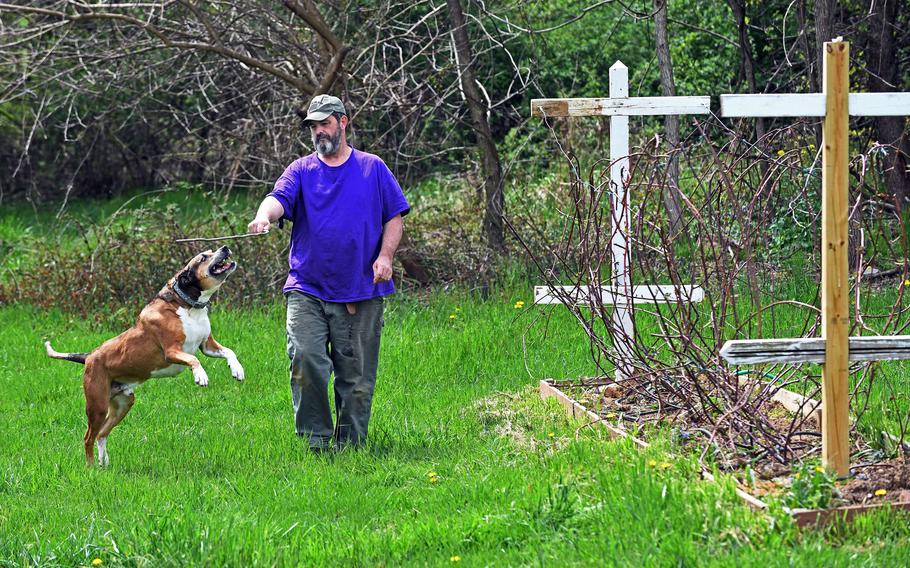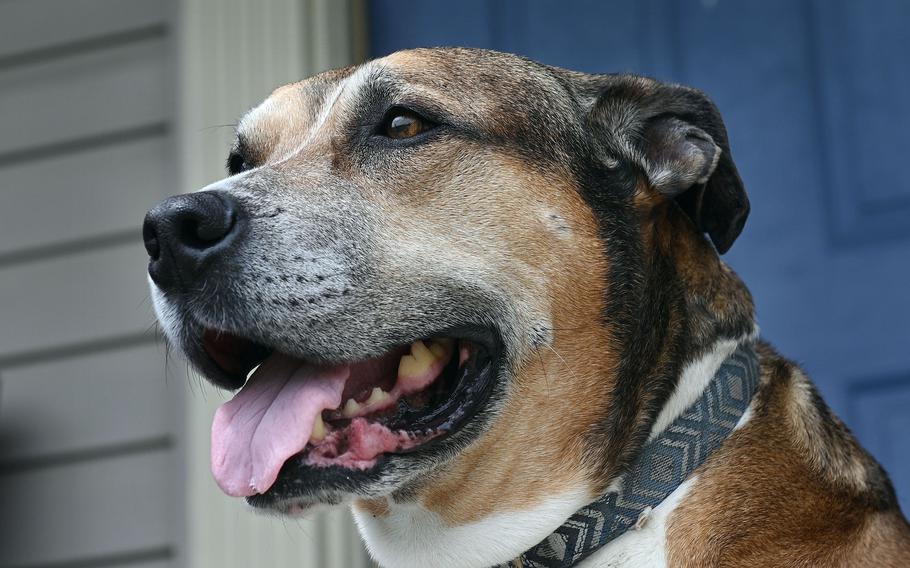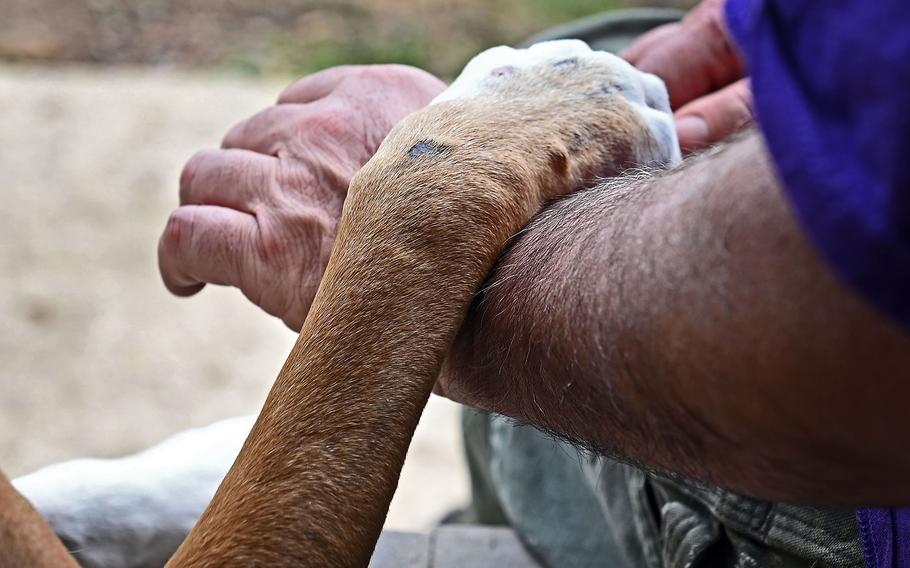
Veteran Donald Rhodes adopted Yankee, a rescue dog, through the low-cost Pets for Patriots program from the Harford County, Conn., animal shelter. (Kenneth K. Lam, Baltimore Sun/TNS)
BALTIMORE (Tribune News Service) — When Stacey Martin, an Army sergeant, gets home at night, she finds Autumn, er dog, by the door, sitting at attention — except for her tail, which quivers in anticipation. Martin can hardly wait, either. It’s a treasured time for both.
“I can have the crappiest day at work, but when I walk in she’s so excited to see me,” said Martin, 26, of Belcamp, Md. “Having an animal love you unconditionally is a feeling like no other. When I’m depressed, Autumn picks up on it, gravitates toward me and licks my face. In some of the worst times of my life, she has brought out those emotions that are near and dear to my heart.”
That’s the goal of Pets for Patriots, a national organization that networks with animal shelters to promote adoptions of homeless dogs and cats by military personnel, both active-duty and retired. Four years ago, while stationed at Aberdeen Proving Ground, Martin and her sergeant husband, Antonio, learned of the program and found Autumn at the Humane Society of Harford County in Fallston. Participants in Pets for Patriots receive adoption discounts, $150 gift cards for pet supplies and, sometimes, veterinarian markdowns as incentives.
“The gift card helped so much but, honestly, we would have taken Autumn anyway,” said Martin.
Since 2010, Pets for Patriots — the brainstorm of a Long Island woman — has found homes for more than 3,700 animals (85% dogs, 15% cats) with military personnel.
“One Memorial Day, I had an epiphany while washing dishes,” said founder Beth Zimmerman, 59, of Long Beach, N.Y. “I thought about veterans and the issues they face, and the plight of [homeless] animals that are hard to adopt.”
Matching the two wrongs, she mused, would make a right.

Veteran Donald Rhodes adopted Yankee, a rescue dog, through the low-cost Pets for Patriots program from the Harford County, Conn., animal shelter. (Kenneth K. Lam, Baltimore Sun/TNS)
“Those serving in the military often move around to places where they have no family or friends — only the pet that they’ve adopted,” Zimmerman said. “It’s a critical bond.”
At the same time, “veterans who are separated from the service can find it hard to adjust to civilian life. They may lack the clarity of purpose they had in the military — and caring for a pet helps them feel like they’ve got that structure, and a buddy, back again.
“Some veterans tell us that, no matter how much they love their families, they only tell their secrets to their dog or cat. There are some things they just can’t talk to other people about, and that release is extremely important to their mental health. It’s like four-legged therapy.”
All Pets for Patriots requires is that adoptees bear some baggage — be it as an older animal, one with special needs or another issue that, for some reason, has kept them on a shelter’s shelf. There’s a reason for that provision.
“Many veterans dealing with physical or emotional challenges see a reflection of their own issues in the animals they adopt,” said Zimmerman. “We had a young airman who returned home from deployment to find that his wife had left him. [Eventually] he went to a shelter and found a dog, cowering in a cage, who’d also been abandoned. The two of them understood each other.”
Clients have acknowledged that embracing a pet has saved not only the animal’s life, but their own as well. Like the Air Force veteran in Illinois who confessed that adopting a disfigured dog named Thunder saved her from committing suicide.
“Every story may not be Kleenex-worthy, but every [pairing] enhances each others’ lives,” Zimmerman said.
A retriever-pit bull mix, Autumn is an anchor in Martin’s hectic life, so much so that in 2019, when she and her spouse were deployed to Japan, they took the dog along. And last year, when they had their first child, they named her Summer — “a coincidence,” she said.
In fact, they’d adopted Autumn while on their honeymoon.
“I said, ‘Let’s go to a shelter and look around,’ “ said Martin, an Army veterinary technician. “I’m very dog-centric, and my husband is always down for my adventures.”
Right off, Autumn stole her heart.
“She was just a baby, 10 months old, just sitting there kind of sad but with the prettiest eyes. I fell in love with her right there,” said Martin. But there was a catch: the pup had ringworm and could not be adopted until cured of the rash.
“It hurt my heart that she was in a kennel. I wanted her home with me,” she said. “That’s when I pulled the ‘vet tech’ card and said I could treat her at home.”
Four days after their wedding, the Martins welcomed their new arrival. On the ride home from the Harford shelter, the 42-pound pooch sat on the back seat, behind the driver, Antonio, and rested her head on his shoulder.
Why name her Autumn?
“It was fall, and her beautiful eyes reminded me of the autumn leaves,” said Martin.
From the start, the dog slept with her folks.
“She likes to cuddle on her own terms, with her head on our legs, touching us in some way,” her owner said. “In a deep sleep, she’ll snore, and when she dreams, she whimpers, her eyes go crazy and her tail wags a bit.”
Seven months later, the couple was deployed to Camp Zuma, a military post 25 miles from Tokyo. Autumn followed suit, skirting Japan’s strict six-month quarantine regulations for dogs because she would live on the U.S. Army base. Soon after, the Martins added another dog, a 2-month-old mongrel with a ripped ear who had been rescued off-base by soldiers who’d seen children picking on the pup.
“We’d been exploring the option of a second dog,” she said, “and Jasper kind of fell into our lap.”
Now the two mutts are pals.
“We call Jasper ‘the librarian’ because he’s kind of boring,” said Martin. “To Autumn, he can be like an annoying little brother. If she has a toy, he’ll try to steal it, though he really only wants it as a means to bother her. Autumn has a personality. Sometimes, when she’s excited, she gets ‘the zoomies’ and starts running back and forth, knocking over stuff while Jasper just stares. Jasper never gets the zoomies.”
Autumn is a doting aunt to the Martins’ daughter, often resting her head on Summer’s legs as the baby sleeps.
“She’s a family member in every sense,” her owner said.

Veteran Donald Rhodes adopted Yankee, a rescue dog, through the low-cost Pets for Patriots program from the Harford County, Conn., animal shelter. (Kenneth K. Lam, Baltimore Sun/TNS)
Donald Rhodes recalled the day his Abingdon family browsed the raucous aisles at the same Harford County shelter.
“One dog, a boxer mix, jumped against the side of his cage to greet us,” said Rhodes, 52. “Our daughter, Layla, looked at him and said, ‘Calm down. Sit.’ So he did.”
And Rhodes, who’d spent 24 years in the military, thought: any dog who will take orders from an 8-year-old is the dog for me.
They adopted the pooch through Pets for Patriots. Seven years later, Yankee — once emaciated and abused — is a strapping and beloved 110-pound house pet who can read Rhodes like a book.
“Yankee cues into my mood routinely,” his owner said. “If my wife and I are having a dispute, he gets concerned and tries to calm us down. He’ll nuzzle up and lick your hand.”
Not until he retired from the service did Rhodes get the urge to adopt. A communications technician, he logged 14 years active duty in the Air Force and 10 more in the Air National Guard. He’s now an engineering contractor for the Army at Aberdeen Proving Ground.
Yankee, he said, is a big galoot who, even at 11, keeps him busy, as with his recent run-in with a skunk.
“A week ago, I let him out at night to do his thing. When I went to get him, he came running out of the dark, along with this enormous odor. So there I was at midnight, washing him in the driveway. He still stinks.”
Since Yankee’s arrival, the Rhodes have rescued yet another, a Chihuahua named Lilly. Guess who’s alpha dog?
“Lilly rules the roost,” Rhodes said. “Yankee could swallow her if he chose to, but when she calls his bluff, he acts like a scaredy-cat.”
©2022 The Baltimore Sun.
Visit at baltimoresun.com.
Distributed by Tribune Content Agency, LLC.